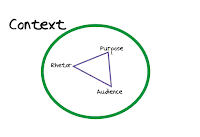
The boys and I were in the backyard as the sun was creeping down toward the horizon. I sat on the porch proofreading my book chapter (which Noah felt was wholly unimpressive) while Nick planted himself in the sandbox and Noah perched himself on top of a little ladder to check out the lemon tree.
"Mom, how does the flower turn into a lemon?" Noah asked as he touched a lemon blossom.
I'll admit, I was geeked. I was going to get to talk to my son about cool science stuff! I went over to the tree to talk with him about pollination.
In language he could understand, I told him about the sperm and the ovules and how bees fly from tree to tree bringing the two together. He already knew about a sperm and an egg coming together to make a baby, so I said it was kind of like that--the bees bring together the sperm and the ovules in the flower, and a baby fruit is born.
I was going to tell him the part that I thought was really cool--that less than one percent of flowers ever become fruit--when he asked me a question.
"Who brings the male and female parts together?"
"The bee, honey," I answered.
"No, not in the flower. With people."
I'm not uncomfortable talking about sex; many of you know this about me. But somehow, in spite of myself, my face flushed and I struggled to find words.
And so I skirted the details, and felt completely lame for doing so. I told him about how a man and a woman decide to mate and then bring their egg and sperm together.
"Do you know what 'mate' means?" I asked.
"Yeah. Marry. Mate. Then die," he answered.
I laughed warmly. It's actually not too different from the way many men I know see the reproductive cycle. "Where did you learn that?" I asked.
"In the butterfly unit at school," he answered. Okay, fair enough. I guess a butterfly doesn't live for too long after mating.
"But how does the sperm get delivered to the egg?" Noah asked.
I knew that I had to answer the question now. For some stupid reason I was still flushed. "It's something you can't talk about at school, okay?" I said, fearing the calls home I would get when a teacher heard him say something about penises on the playground. This stuff happens. Like when Noah got obsessively interested in movie ratings, and his dad made the mistake of telling him that X was the worst of the worst movie ratings . . . Noah had no clue what the content of an X-rated movie was, but next thing I know, his teacher is complaining that Noah is talking about X-rated movies at school.
Noah agreed not to talk about it at school, and then I started to explain. "The sperm comes out of the man's penis and goes into the woman."
"This is a weird conversation," Noah said.
I laughed. "I know, honey." And just then, with our joint admission that it was weird, the nervousness was gone.
I took my son over to my chair on the porch and sat him down on my lap. I explained the nuances of male and female anatomy and how the two came together. Noah listened and put the pieces together in his head, with just a little confusion when he thought at first the belly button was the opening I was talking about. And then, when he'd learned all he needed to know, he said, "Okay, time to change topics."
So we talked about video games, and I realized my son wasn't a baby anymore.

